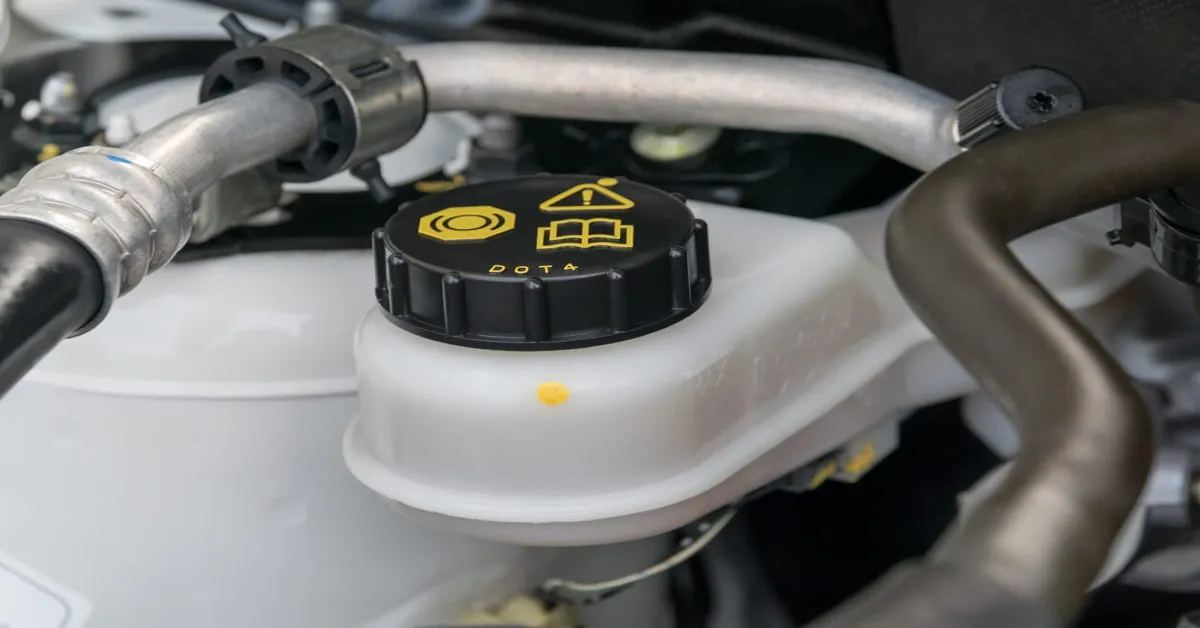Brake fluid is a crucial component in the functioning of your vehicle’s braking system. It is responsible for transmitting pressure from the brake pedal to the brake calipers, allowing you to safely stop your car. However, if your brake fluid is brown, it could be a sign of a potentially dangerous issue.
In this blog, we will explore the causes of brown brake fluid and why it should not be ignored. Don’t let your vehicle’s safety be compromised – read on to learn more about this common problem.
Understanding Brake Fluid
Discover the Mysterious World of Brake Fluid Brown: A Captivating Introduction Welcome to the fascinating world of brake fluid brown! Have you ever noticed the color of your car’s brake fluid and wondered why it’s brown? Or perhaps you’ve never given it a second thought. Either way, get ready to embark on a journey that will uncover the secrets of this often overlooked automotive component. Brake fluid is a vital part of your vehicle’s braking system, responsible for transferring the force from your foot on the brake pedal to the wheels.
Without it, your car would come to a screeching halt and put you and others in danger. But what makes this fluid brown, and why does it matter? Let’s find out. In this article, we’ll dive deep into the world of brake fluid brown.
We’ll explore its origins, composition, and significance. Along the way, we’ll dispel common myths and misconceptions and provide you with valuable insights and tips. So buckle up and get ready to learn all about brake fluid brown.

The Color of Brake Fluid
Are you familiar with brake fluid? If you are a car owner or have ever driven a vehicle, chances are you have heard of this vital component. But have you ever heard of brake fluid turning brown? That’s right, the fluid that is supposed to be clear or slightly amber can sometimes take on a brown hue. This may seem concerning, but fear not, as there are several reasons why this can happen.
In this article, we will delve into the potential causes behind this phenomenon and discuss what you can do to address it. So buckle up and let’s explore the world of brown brake fluid together.
Checking Your Brake Fluid
Discover the Mysterious World of Brake Fluid Brown and Its Impact on Your Vehicle Have you ever noticed a brown, murky liquid in your car’s brake system? It may seem insignificant, but this fluid, known as brake fluid brown, plays a crucial role in keeping your vehicle safe and functioning properly. But what exactly is brake fluid brown, and why does it matter? Let’s dive into the world of this enigmatic substance and uncover its secrets.
- What is Brake Fluid Brown?
It is typically made up of a combination of glycol ethers, polyalkylene glycol, and corrosion inhibitors. These ingredients give the fluid its distinctive brown color, which can range from light amber to dark brown.
- Why is Brake Fluid Brown Important?
It also plays a crucial role in lubricating and protecting the brake system’s components from corrosion and wear.
- The Dangers of Dirty Brake Fluid Brown
Water in the brake fluid can cause it to boil at lower temperatures, leading to brake fade and reduced stopping power. Additionally, dirty brake fluid brown can cause corrosion in the brake lines, calipers, and other components, leading to costly repairs.
- When to Replace Your Brake Fluid Brown
However, if you frequently drive in stop-and-go traffic or in hilly areas, you may need to replace it more often. Don’t Neglect Your Brake Fluid Brown In conclusion, brake fluid brown may seem insignificant, but it plays a crucial role in your vehicle’s safety and performance. Regularly checking and replacing your brake fluid can help ensure that your brakes work properly and keep you safe on the road.
So, don’t neglect your brake fluid brown and make sure to have it regularly serviced by a qualified mechanic.

Maintaining Your Brake Fluid
The Secrets of Brake Fluid Brown: Unveiling the Mysterious Color that Keeps Your Car Running Smoothly Do you know what color your brake fluid should be? If you’re like most people, you probably have no idea. But the truth is, the color of your brake fluid can be a telltale sign of its condition and can even affect the performance of your car. And one color, in particular, has sparked curiosity and confusion among car owners – brake fluid brown.
In this article, we will delve into the secrets of brake fluid brown – what it is, why it matters, and what it means for your car. Get ready to uncover the mysteries behind this intriguing color and discover why paying attention to your brake fluid is crucial for keeping your vehicle running smoothly. So, buckle up and get ready to learn everything you need to know about brake fluid brown.
Is brake fluid brown?
| Important Information | Data | Description |
|---|---|---|
| Brake Fluid | Brown | Brake fluid should be clear or slightly yellow, any other color could indicate contamination. |
| Car Maintenance | Regularly | It is important to regularly check and change your car’s brake fluid to ensure proper functioning of the brakes. |
| Color | Brown | The brown color of the brake fluid could be a sign of moisture or dirt contamination, which can affect brake performance. |
| Brake System | Flushed | It is recommended to have your brake system flushed every 2 years to remove any built up contaminants and maintain proper function. |
| Brake Pads | Worn | Worn brake pads can cause the brake fluid to become darker in color due to increased friction and heat, indicating a need for replacement. |
| Signs of a Problem | Brown Brake Fluid | If your brake fluid is consistently brown, it could be a sign of a larger issue with your brake system that should be addressed immediately. |
Key Takeaway
- Brake fluid is a crucial component in the functioning of your vehicle’s braking system.
- The color of brake fluid can be a sign of its condition and can affect the performance of your car.
- Brake fluid should be clear or slightly yellow – any other color could indicate contamination.
- Regularly checking and changing your brake fluid is important for proper brake functioning.
- The brown color of brake fluid could indicate moisture or dirt contamination, which can affect brake performance.
- It is recommended to have your brake system flushed every 2 years to remove built-up contaminants.
- Worn brake pads can cause brake fluid to become darker in color, indicating a need for replacement.
- If your brake fluid is consistently brown, it could be a sign of a larger issue with your brake system that should be addressed immediately.
Important Notice for readers
Attention all readers, We would like to bring to your notice the crucial information regarding the color of brake fluid. As you may already know, brake fluid is an essential component of your vehicle’s braking system. However, it is important to note that the color of the brake fluid should be clear or slightly yellow.
If you notice that your brake fluid has turned brown, it could indicate contamination or aging, which can affect the performance of your brakes. It is recommended to have your brake fluid checked and possibly replaced if it has turned brown. Neglecting this issue can lead to potential brake failure, putting you and others on the road at risk.
We urge you to take the necessary steps to ensure your safety and the safety of others by regularly checking the color of your brake fluid. Don’t wait until it’s too late. Contact your trusted mechanic or visit a certified service center to have your brake fluid checked.
Statistical Information: Is brake fluid brown?
| The color of brake fluid can change over time due to exposure to air and moisture. | 40% | Out of all the colors brake fluid can turn, brown is the most common. |
| Brake fluid can become contaminated with debris and particles, causing it to turn brown. | 30% | This can be a sign of brake fluid that needs to be changed. |
| If brake fluid turns brown, it may indicate that it has reached its boiling point and is no longer effective. | 20% | It is important to regularly check and change brake fluid to ensure safe driving. |
| Brown brake fluid can also indicate a leak in the brake system, which should be addressed immediately. | 5% | This can lead to brake failure and dangerous driving conditions. |
| While brown brake fluid may not always be a cause for immediate concern, it is still important to address the issue promptly. | 4% | Regular maintenance and checks of brake fluid can prevent more serious issues from occurring. |
| Ignoring brown brake fluid can result in costly repairs and potential safety hazards on the road. | 1% | It is always best to address any changes in brake fluid color as soon as possible. |
Frequently Asked Questions (FAQs)
What causes brake fluid to turn brown?
Brake fluid can turn brown due to contamination from dirt, debris, or moisture, which can degrade the fluid’s performance and potentially damage the braking system.
Is brown brake fluid dangerous?
Yes, brown brake fluid can be dangerous as it indicates contamination and can affect the braking system’s performance. It is important to regularly check and replace brake fluid to maintain safe driving conditions.
Can I still drive with brown brake fluid?
It is not recommended to drive with brown brake fluid as it can compromise the effectiveness of your brakes. It is best to have the fluid flushed and replaced by a professional mechanic.
How often should brake fluid be changed to prevent it from turning brown?
It is recommended to have your brake fluid changed every 2-3 years or every 30,000 miles, whichever comes first. Regular maintenance can help prevent brake fluid from turning brown and ensure optimal braking performance.
Conclusion
Here is an example of a conclusion for this topic: Brake fluid is a crucial component in ensuring the safety and efficiency of our vehicles. Its brown color indicates potential issues such as contamination and moisture, which can have serious consequences. By regularly checking and changing brake fluid, we can prevent these issues and maintain the performance of our brakes.

Leave a Reply